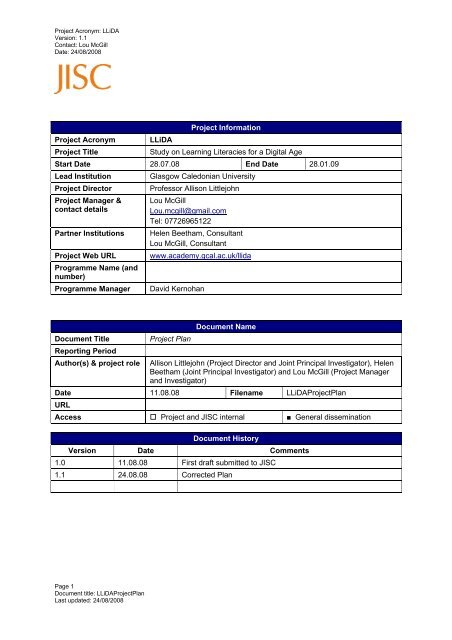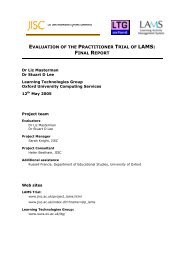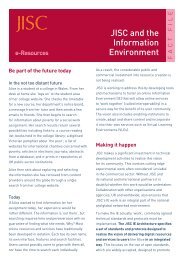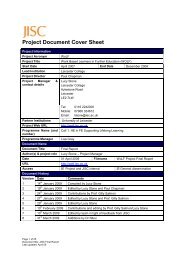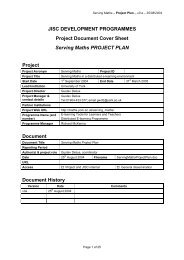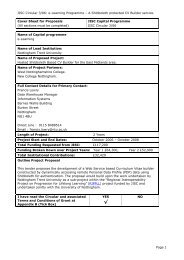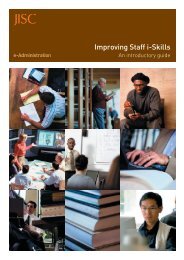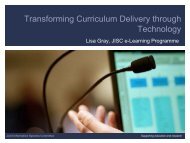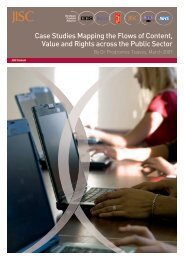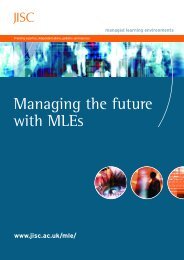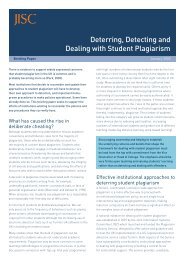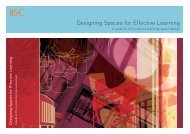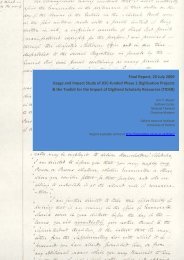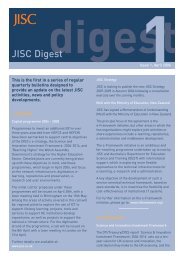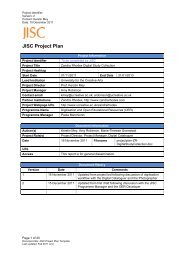LLiDA Project Plan - Jisc
LLiDA Project Plan - Jisc
LLiDA Project Plan - Jisc
You also want an ePaper? Increase the reach of your titles
YUMPU automatically turns print PDFs into web optimized ePapers that Google loves.
<strong>Project</strong> Acronym: <strong>LLiDA</strong><br />
Version: 1.1<br />
Contact: Lou McGill<br />
Date: 24/08/2008<br />
<strong>Project</strong> Acronym<br />
<strong>Project</strong> Title<br />
<strong>LLiDA</strong><br />
<strong>Project</strong> Information<br />
Study on Learning Literacies for a Digital Age<br />
Start Date 28.07.08 End Date 28.01.09<br />
Lead Institution<br />
<strong>Project</strong> Director<br />
<strong>Project</strong> Manager &<br />
contact details<br />
Partner Institutions<br />
<strong>Project</strong> Web URL<br />
Programme Name (and<br />
number)<br />
Programme Manager<br />
Glasgow Caledonian University<br />
Professor Allison Littlejohn<br />
Lou McGill<br />
Lou.mcgill@gmail.com<br />
Tel: 07726965122<br />
Helen Beetham, Consultant<br />
Lou McGill, Consultant<br />
www.academy.gcal.ac.uk/llida<br />
David Kernohan<br />
Document Title<br />
Reporting Period<br />
Author(s) & project role<br />
<strong>Project</strong> <strong>Plan</strong><br />
Document Name<br />
Allison Littlejohn (<strong>Project</strong> Director and Joint Principal Investigator), Helen<br />
Beetham (Joint Principal Investigator) and Lou McGill (<strong>Project</strong> Manager<br />
and Investigator)<br />
Date 11.08.08 Filename <strong>LLiDA</strong><strong>Project</strong><strong>Plan</strong><br />
URL<br />
Access <strong>Project</strong> and JISC internal ■ General dissemination<br />
Document History<br />
Version Date Comments<br />
1.0 11.08.08 First draft submitted to JISC<br />
1.1 24.08.08 Corrected <strong>Plan</strong><br />
Page 1<br />
Document title: <strong>LLiDA</strong><strong>Project</strong><strong>Plan</strong><br />
Last updated: 24/08/2008
<strong>Project</strong> Acronym: <strong>LLiDA</strong><br />
Version: 1.1<br />
Contact: Lou McGill<br />
Date: 24/08/2008<br />
<strong>LLiDA</strong> (Learning Literacies for a Digital Age) <strong>Project</strong> <strong>Plan</strong><br />
Overview of <strong>Project</strong><br />
1. Background<br />
Our understanding of ‘learning literacies’ encompasses the range of practices that underpin<br />
effective learning in a digital age. We are using the phrase ‘learning literacies for a digital age’<br />
rather than ‘digital literacies’ to indicate that we are open to finding major continuities in what<br />
makes for effective learning and in how institutions should provide for it, while at the same<br />
time foregrounding a context in which what is required of learners – and how institutions need<br />
to support them – may be changing fundamentally.<br />
We use the term ‘(underpinning) practices’ to indicate that we understand the term ‘literacy’ - in<br />
contrast to the term ‘skill’ – to involve:<br />
• a foundational knowledge or capability, such as reading, writing or numeracy, on which more<br />
specific skills depend<br />
• a cultural entitlement – a practice without which a learner is impoverished in relation to<br />
culturally valued knowledge<br />
• communication – expressing how an individual relates to culturally significant communications<br />
in a variety of media<br />
• the need for practice – acquired through continued development and refinement in different<br />
contexts, rather than once-and-for-all mastery<br />
• a socially and culturally situated practice – often highly dependent on the context in which it is<br />
carried out<br />
• self-transformation - literacies (and their lack) have a lifelong, lifewide impact.<br />
We use the term ‘effective learning’ in the sense implied by the call, as characteristic of ‘skilled,<br />
digitally aware learners with the capacity to participate in learning using technologies of their own<br />
choosing’. However, we expect to broaden and add detail to this definition. We use the term ‘digital<br />
age’ as a shorthand for technical, social, economic, cultural and educational contexts in which digital<br />
forms of information and communication predominate. In this study we will be exploring how these<br />
new and emergent contexts are shaping current literacy provision in UK HE and FE, but also how we<br />
anticipate that literacy provision needs to adapt to fit graduates for living and working in such<br />
contexts.<br />
We see effective learning practice as arising not only from technical aptitudes but also from the<br />
learner’s previous experiences, self-efficacy and motivation (Philip 1991), and from qualities of the<br />
environment where that practice takes place (including digital technologies). We will be reviewing<br />
conceptual frameworks from general education as background for the newer areas of information<br />
literacy, (multi)media literacy and computer literacy. We see little evidence that even highly-skilled<br />
networkers are learning online in the deep and self-transforming ways offered by formal postcompulsory<br />
education (British Library 2008). However, we do see challenges to conventional ideas of<br />
academic practice and ‘effective learning’ from a range of new activities, particularly in self-organised<br />
social networks. We therefore include in our study consideration of learner-generated literacy<br />
practices and examples of learner-to-learner support.<br />
Sharpe and Beetham (2008), drawing on evidence from the JISC’s ‘learners experiences of e-<br />
learning’ programme, have presented a model of development in which learners progress from<br />
access through functional skills to personal strategies with technology, and finally to a form of<br />
internalisation whereby technologies are used as extensions of the learner’s personal intentions and<br />
motives to learn. We will be looking in part to validate this model through the evidence we gather. It<br />
fits well with prevailing historical accounts of the emergence of ‘literacies of the digital’ (see for<br />
example Martin and Madigan, 2006), which see critical, evaluative and reflective skills coming to<br />
prominence after several decades of focus on technical ICT competence.<br />
Page 2<br />
Document title: <strong>LLiDA</strong><strong>Project</strong><strong>Plan</strong><br />
Last updated: 24/08/2008
<strong>Project</strong> Acronym: <strong>LLiDA</strong><br />
Version: 1.1<br />
Contact: Lou McGill<br />
Date: 24/08/2008<br />
From the Dearing Report to the Leitch agenda for higher-level skills, Government directives have<br />
encouraged a focus on skills and employability. Our study will consider the impact of these and other<br />
policy drivers, noting that UK employers find it difficult to recruit graduates with the attributes they<br />
need and expect (Archer and Davidson, 2008). However, the Government skills agenda and the<br />
requirements of graduate employers do not necessarily take into account the lifelong, lifewide needs<br />
of learners. We know that learners in the digital age will need to be adaptable, flexible, self-directed<br />
and resilient to cope with complex lives as.workers, but also as citizens, carers, consumers and<br />
creative people (Sharpe et al, 2006; Creanor et al, 2007).<br />
2. Aims and Objectives<br />
The aim of this study is to examine the state of learning literacy provision within UK Higher Education<br />
(HE) and Further Education (FE)<br />
The objectives of this study are to:<br />
• gain a better understanding of current definitions of learning literacies, and examples of<br />
relevant competency frameworks, as they may be applied to UK HE and FE.<br />
• gather a body of evidence concerning the range of learning literacies which are currently<br />
being supported in institutions.<br />
• identify and record examples of learners AND teachers using technology to support their<br />
academic practice, and evidence of how ‘effective’ digital learners and teachers came to be<br />
so.<br />
3. Overall Approach<br />
The study will address three broad questions. Not all of the necessary evidence has previously been<br />
collected, so two highly-targeted data collection exercises will be carried out to augment the desk<br />
work. The questions and the methods we propose for tackling them are set out in this section.<br />
3.1 What practices underpin effective learning in the digital age?<br />
3.1a Conceptual and competency frameworks relevant to learning literacies in UK HE and FE<br />
This workpackage will draw together the most significant competency frameworks that have been<br />
developed for or applied in UK HE and FE. Data will be collated about the aptitudes and practices<br />
covered, and frameworks’ credibility, robustness and flexibility will be assessed. Where available, we<br />
will examine evidence of each framework’s adoption and impact in UK institutions. Recent European<br />
frameworks relating to digital and media literacy will also be examined, along with significant models<br />
from the US and Australia. The study will also briefly consider the role of more specific and local<br />
models such as those established by subject benchmarks. Conceptual frameworks which imply but do<br />
not specify competences will be included where they contribute significantly to the study.<br />
Method: desk review supported by email or telephone contact with key organisations as necessary,<br />
particularly to establish uptake. See Appendix C for a draft list of frameworks.<br />
3.1b The changing landscape of learning literacies<br />
'New literacies' (Lankshear and Knobel 2003) is gaining ground as a term for understanding how<br />
changes in technology, in social practice around technology, and in cultures of knowledge are<br />
demanding a serious reconsideration of literacies. This section of the study will consider these<br />
changing contexts and the likely impact on requirements for learning literacy provision in UK HE and<br />
FE, over at least the next 5 years.<br />
Method: desk review supported by email or telephone contact with key programme staff as<br />
necessary..This will involve a brief overview of:<br />
• changing learner requirements, backgrounds and expectations<br />
• changing requirements of disciplines and professions<br />
• changing needs of employers, communities and the wider economy<br />
• changing information and communication technologies, including patterns of access<br />
and use<br />
Page 3<br />
Document title: <strong>LLiDA</strong><strong>Project</strong><strong>Plan</strong><br />
Last updated: 24/08/2008
<strong>Project</strong> Acronym: <strong>LLiDA</strong><br />
Version: 1.1<br />
Contact: Lou McGill<br />
Date: 24/08/2008<br />
Appendix D includes an indicative list of prior studies and a table of programmes proposed for<br />
contact.<br />
3.2 How are learning literacies currently being supported in UK HE and FE institutions?<br />
3.2a Institutional audits<br />
Initial scoping work will consider how far this question can be answered through existing evidence,<br />
especially the outcomes of projects funded under the HE Academy Pathfinder, SFC eLearning<br />
Transformation, JISC ReProduce, JISC/NSF Digital Libraries in the Classroom and JISC Distributed<br />
e-Learning programmes. However, it is not anticipated that these sources will be capable of<br />
answering the question with any accuracy.<br />
Method: Desk work augmented by an audit of 12 partner institutions, identified as leading current<br />
practice in learning literacy provision, but providing a balance of institutional types.<br />
The audit tool will be developed and piloted at Glasgow Caledonian University and finalised in<br />
consultation with the 11 other institutional representatives (see appendix C). Questions will cover:<br />
• What learning literacies are visible in policies, strategies, service level agreements?<br />
• What learning literacies are supported by central services (e.g. library, learning<br />
development)?<br />
• What learning literacies, if any, are actively embedded into subject curricula?<br />
Within each category questions will be asked about the type of provision, its scope and scale<br />
including uptake, the roles of staff involved, and evidence of any impact or benefits for learners. The<br />
audit tool will be publicly disseminated with the intention that its use will raise awareness and help<br />
institutions to develop their own provision. Auditors will each be paid £800 for submission of an<br />
institutional case study: see Appendix E for a draft list of audit institutions. Case study evidence will<br />
be collated and analysed for any apparent trends including strengths and weaknesses in current<br />
provision<br />
3.2b Snapshots of best practice<br />
Good practice in literacy development and support can take place under the institutional radar,<br />
particularly where it is learner-initiated. In addition to ‘top down’ audits of institutional provision, we will<br />
collect best practice examples from a wide range of individuals involved in learning literacy support.<br />
We will seek examples of the three types of provision audited in 2(a). (policy, central services and<br />
curricular), but in addition will look for evidence of ‘learner-led’ provision, i.e. development of their<br />
capacity to learn effectively which learners are undertaking for themselves.<br />
Method: online campaign, inviting submission of examples using a pro-forma adapted from the JISC<br />
‘Tangible Benefits of e-Learning’ pro-forma. The examples will be concise (< 2 sides of A4, written to<br />
a tight brief) and accompanied where relevant by evidence of learner engagement or impact.<br />
Working in partnership with the Learn Higher CETL and ALDENE, we will extend invitations to submit<br />
examples across the learning development community. Invitations will also be circulated via the HELF<br />
and HEDG networks, the Subject Centre Network, JISC e-learning networks and two Librarians’<br />
jiscmail lists, LIS-INFOLITERACY and LIS-LINK. Additional networks to be accessed will include HEA<br />
Pathfinder, JISC TechDis, and JISC Infonet. We will seek student participation through LexDis and<br />
other projects involved in the JISC Learners’ Experiences of e-Learning programme, through the NUS<br />
at participating (audit) institutions, SPARQs, the DIUS ‘Listening to Learners’ forums, and FutureLab’s<br />
Beyond Current Horizons programme (see Appendix B for details of these agencies and networks)<br />
Interested parties will be directed to a wiki page where they can read a brief and submit a short<br />
statement about the best practice they propose to document. 30-35 will be accepted (expected<br />
attrition rate 5-25%) and sent the case study pro-forma to complete. On submission of a completed<br />
pro forma, participants will be paid £100.<br />
3.3 What is the evidence of successful outcomes for learners from different types of learning<br />
literacy provision?<br />
We anticipate that desk research will find limited reliable evidence of the impact of different types of<br />
provision (Reid 2006 focuses on staff not student skills). Our analysis will therefore draw on:<br />
Page 4<br />
Document title: <strong>LLiDA</strong><strong>Project</strong><strong>Plan</strong><br />
Last updated: 24/08/2008
<strong>Project</strong> Acronym: <strong>LLiDA</strong><br />
Version: 1.1<br />
Contact: Lou McGill<br />
Date: 24/08/2008<br />
• Outcomes of the foregoing desk studies, collated to produce a mindmap of existing studies<br />
and project outcomes, detailing any evidence of success/impact for interventions around<br />
learning literacies.<br />
• Evidence of impact/success submitted under (2a) and (2b).<br />
• Online focus group with researchers in the HEA ELESIG network addressing the question:<br />
‘How do ‘effective’ learners come to be so?’ and collating evidence from the many projects<br />
represented.<br />
• Advice and input from our virtual working group, representing a wide range of agencies,<br />
special interest groups and personal expertise.<br />
4. <strong>Project</strong> Outputs<br />
• list of key practices or competences to be understood within the term ‘learning literacies’ for<br />
the purposes of the study, with working definitions of these<br />
• summary of relevant frameworks with comments on uptake and impact on models adopted by<br />
UK institutions<br />
• future learning scenarios and overview of likely future requirements for learning literacies<br />
• audit tool designed to elicit current institutional practice in learning literacies provision<br />
• twelve institutional case studies, rendered anonymous for publication<br />
• summary of how learning literacies are being supported in UK HE and FE institutions, with<br />
analysis of strengths and weaknesses in current sector practice<br />
• wiki of best practice examples, tagged with relevant literacies and with support ‘type’. These<br />
will be made available to JISC Infonet to include in the LRA Infokit and other JISC<br />
communications<br />
• mindmap of existing studies and project outcomes, detailing any evidence of success/impact<br />
for interventions around learning literacies<br />
• review of evidence identifying success factors in learning literacies provision. We do not<br />
expect this review to be definitive, but will offer recommendations for further work where<br />
appropriate.<br />
5. <strong>Project</strong> Outcomes<br />
The study will inform JISC and the wider UK FE and HE communities by providing a better<br />
understanding of learning literacies, how they are evolving, how requirements are changing, and how<br />
they may be supported in different contexts. Recommendations to the JISC will provide a strong<br />
foundation for commissioning further work, including (anticipated) trialling of alternative institutional<br />
approaches. These recommendations will inform all three main programmes being funded by the<br />
JISC from 2008 forwards: The Curriculum Design and Delivery programmes, the Lifelong<br />
Learning/Employer Engagement programme, and the anticipated Open Content programme. They will<br />
also enable informed action on the part of partner institutions and networks such as the HE Academy,<br />
the learning development community, and the libraries community.<br />
Embedding of practitioner-focused outcomes into workshops to be run by ELESIG and the ‘Learner<br />
Experiences of e-Learning’ team will ensure rapid uptake of tools and findings.<br />
By engaging with real examples of academic and learners practices we hope to provide compelling<br />
evidence of how effective digital learners develop and can be supported, and materials on which staff<br />
development of various kinds can be based.<br />
Page 5<br />
Document title: <strong>LLiDA</strong><strong>Project</strong><strong>Plan</strong><br />
Last updated: 24/08/2008
<strong>Project</strong> Acronym: <strong>LLiDA</strong><br />
Version: 1.1<br />
Contact: Lou McGill<br />
Date: 24/08/2008<br />
6. Stakeholder Analysis<br />
Stakeholder Interest / stake Importance<br />
Funding Councils, JISC<br />
JISC services, HE Academy Subject Centres,<br />
CETLS, RSCs, Intute, JORUM<br />
Ensuring e-learning and content<br />
services are widely used, and that<br />
uptake of services is effective in<br />
supporting lifelong, lifewide<br />
learning<br />
High<br />
JISC funded projects especially Curriculum<br />
Delivery projects, projects under future<br />
Lifelong Learning and Open Content calls<br />
Government bodies concerned with skills<br />
development and employability<br />
Employers, skills agencies<br />
HE institutional managers<br />
HE staff in Academic Departments, Central<br />
Services<br />
Learners<br />
Actual use of outputs including<br />
workshops, resources and<br />
recommendations to support<br />
embedding of learning literacies.<br />
Increasing demand to<br />
equip learners with skills<br />
necessary to retain national<br />
competitiveness in the global<br />
economy<br />
This includes consideration of<br />
learning literacies and the digital<br />
learning landscape in provision of<br />
competency development and<br />
employability services.<br />
Reduction of ‘time to competence’<br />
through employment of able<br />
graduates and appropriately skilled<br />
workforce.<br />
Informing institutional support for<br />
the development of autonomous<br />
learners through employability and<br />
lifelong learning initiatives.<br />
Recruitment and retention are<br />
affected by learning literacies.<br />
Better informed support for<br />
embedding learning literacies into<br />
curricula.<br />
Staff with enhanced capacity to<br />
teach and support learning in a<br />
digital age. The extension of<br />
employability services to include<br />
learning approaches.<br />
The capacity to adapt to wide<br />
range of challenges through an<br />
ability to learn autonomously.<br />
Flexibility, resilience, employability,<br />
adaptability<br />
Enjoyment of lifelong, lifewide<br />
learning opportunities<br />
High<br />
High<br />
High<br />
High<br />
High<br />
High<br />
Page 6<br />
Document title: <strong>LLiDA</strong><strong>Project</strong><strong>Plan</strong><br />
Last updated: 24/08/2008
<strong>Project</strong> Acronym: <strong>LLiDA</strong><br />
Version: 1.1<br />
Contact: Lou McGill<br />
Date: 24/08/2008<br />
7. Risk Analysis<br />
Risk Probability Impact Remediating action<br />
Incapacity of key Low High By doubling up on the roles of PI and research<br />
player to fulfil tasks<br />
consultant, the project has flexibility to adjust to<br />
Difficulty attracting<br />
and retaining<br />
participants in best<br />
practice exercise<br />
Difficulty retaining<br />
interest from virtual<br />
working<br />
group/auditors<br />
Complexity of<br />
methodology<br />
overwhelms capacity<br />
for analysis<br />
Participants may be<br />
reluctant to record<br />
failures<br />
8. Standards<br />
N/A<br />
9. Technical Development<br />
N/A<br />
changes in individual capacity.<br />
Medium Medium Small scale payment to participants has proven to<br />
be the most effective means of collecting<br />
examples of this kind. By exercising selection we<br />
expect to achieve a 75-95% completion rate.<br />
Low Medium Individuals have self-selected on the basis of their<br />
interest in and commitment to the study. Payment<br />
at consultancy rates recognises their commitment.<br />
Other potential participants have been identified.<br />
Low High Work packages build summatively towards the<br />
final analysis, with interim analyses and managed<br />
dependencies. Members of the team have used<br />
these methods successfully in previous projects.<br />
High Medium Offer participating institutions the opportunity of<br />
anonymity if required. This may require adjustment<br />
to recording instruments<br />
10. Intellectual Property Rights<br />
The project will comply with the terms of the JISC funding agreement. HEFCE will hold all intellectual<br />
property rights on behalf of JISC and the other funding councils. Contributors and other sources will<br />
be appropriately referenced and informed. Appropriate actions will be taken in relation to ethics<br />
according to individual institutional requirements.<br />
<strong>Project</strong> Resources<br />
11. <strong>Project</strong> Partners<br />
Name Role in project Contact details<br />
Professor Allison<br />
Littlejohn<br />
<strong>Project</strong> Director and Joint Principal<br />
Investigator (5 days)<br />
Helen Beetham Joint Principal Investigator (24<br />
days)<br />
Lou McGill<br />
<strong>Project</strong> manager 10% and<br />
Investigator (22 days)<br />
allison.littlejohn@gcal.ac.uk<br />
70 Cowcaddens Road,<br />
Glasgow, G4 0BA<br />
Tel: 0141 331 84-9<br />
Fax: 0141 273 1318<br />
Helen.beetham@tiscali.co.uk<br />
Tel: 07866 360329<br />
Lou.mcgill@gmail.com<br />
Tel: 07726965122<br />
Fiona McBeth <strong>Project</strong> administrator (3 days) Fiona.mcbeth@gcal.ac.uk<br />
Tel: 0141-331-3735<br />
Page 7<br />
Document title: <strong>LLiDA</strong><strong>Project</strong><strong>Plan</strong><br />
Last updated: 24/08/2008
<strong>Project</strong> Acronym: <strong>LLiDA</strong><br />
Version: 1.1<br />
Contact: Lou McGill<br />
Date: 24/08/2008<br />
12. <strong>Project</strong> Management<br />
The project will be directed by Professor Allison Littlejohn, and managed on a day to day basis by Lou<br />
McGill with administrative assistance from Fiona McBeth. Lou McGill will be in regular contact with the<br />
JISC programme manager and make interim reports as detailed in the work plan. A virtual working<br />
group (VWG) will advise on the proposed methodology near the outset of the study and review the<br />
draft outputs at two later points. This will be designed to ensure that the communities most centrally<br />
concerned with the issues involved are fully involved in the study. For convenience given the short<br />
time-scale and limited funding involved, the virtual working group will be substantially the same<br />
people as the institutional auditors. Several respected experts in the field have also been invited to<br />
join the VWG:<br />
• Michelle Verity, Manager, LearnHigher<br />
• John Hilsdon, Chair, ALDENE<br />
• Malcolm Ryan, Chair, ELESIG<br />
• Terry Mayes, Consultant, EdSUT and TESEP<br />
• Rhona Sharpe, Chair, ELESIG network; Associate Editor, International Journal for Academic<br />
Development; Director, JISC Learners' Experiences of e-Learning Support and Synthesis<br />
<strong>Project</strong>; HEA Pathfinder Network<br />
• Jan Howden, Chair, SCONUL Working Group on Information Literacy and Associate Director<br />
of Learning Support, GCaL<br />
Responsibility for specific work packages has been distributed among the project team according to<br />
skills and availability.<br />
The project team will maintain day to day email, skype and telephone contact and hold monthly telemeetings<br />
to ensure progress to the project plan and discuss any issues or alterations as appropriate.<br />
The JISC Programme Manager will be invited to join these meetings. A face to face meeting is<br />
planned for Monday 6 th October at Glasgow Caledonian University.<br />
13. Programme Support<br />
It will be useful to receive alerts to any ongoing JISC work that may be relevant to the study. The<br />
<strong>Project</strong> Manager will be responsible for initiating and maintaining contact as appropriate and will<br />
ensure that Programme Managers for this study are kept informed.<br />
14. Budget<br />
see Appendix A<br />
Detailed <strong>Project</strong> <strong>Plan</strong>ning<br />
15. Workpackages<br />
see Appendix B<br />
16. Evaluation and Quality <strong>Plan</strong><br />
Timing<br />
Ongoing<br />
Factor to<br />
Evaluate<br />
Desk<br />
research<br />
Questions to<br />
Address<br />
Are we getting a<br />
broad picture of<br />
various elements<br />
but ensuring<br />
usefulness by not<br />
Method(s)<br />
Regular review of progress<br />
within the team and<br />
feedback from key experts<br />
(from virtual working group)<br />
Measure of Success<br />
Sufficient background<br />
information and<br />
evidence to inform other<br />
deliverables<br />
Page 8<br />
Document title: <strong>LLiDA</strong><strong>Project</strong><strong>Plan</strong><br />
Last updated: 24/08/2008
<strong>Project</strong> Acronym: <strong>LLiDA</strong><br />
Version: 1.1<br />
Contact: Lou McGill<br />
Date: 24/08/2008<br />
spending too<br />
much time on<br />
this?<br />
Ongoing Interviews Are we talking to<br />
the right people?<br />
Are we asking the<br />
right questions?<br />
Cross-checking between<br />
investigators<br />
Representation from a<br />
range of people in the<br />
sector (managers,<br />
practitioners, librarians<br />
technical and support<br />
teams)<br />
Check for gaps with JISC<br />
programme manager.<br />
JISC satisfied with<br />
range of contacts.<br />
Ongoing<br />
Ongoing<br />
Summati<br />
ve<br />
Institutional<br />
audits<br />
Best<br />
practice<br />
exemplars<br />
Final report<br />
Other<br />
outcomes<br />
Are we getting a<br />
good mixture of<br />
institutions and<br />
models?<br />
Are the tools<br />
robust and<br />
useable?<br />
Are we getting a<br />
good mix of<br />
example types<br />
and contributors<br />
(students, different<br />
staff roles)?<br />
Are the examples<br />
of high quality and<br />
useful to others?<br />
Is the report<br />
informative,<br />
relevant, easily<br />
understood by the<br />
key audiences?<br />
Does the report<br />
make valuable<br />
recommendations<br />
that build on<br />
previous JISC<br />
work and help it<br />
take future work<br />
forwards?<br />
Are materials,<br />
tools and<br />
recommendations<br />
useable and<br />
embedded?<br />
Pilot test questions at<br />
Glasgow Calendonian<br />
University<br />
Ensure that a wide range<br />
of institutions are involved<br />
– by type, geographical<br />
area, sector, approaches.<br />
Pilot tools at GCal.<br />
Receive feedback on draft<br />
tools from auditors and<br />
virtual working group.<br />
Selection of proposed<br />
examples against criteria<br />
before contributions<br />
collected<br />
Involvement of key experts<br />
and networks to ensure<br />
high level contributions<br />
Liaison with LexDis project<br />
(database of ‘good<br />
practice’ in learning with<br />
technology)<br />
Interim report feedback<br />
from JISC project manager<br />
and VWG<br />
Feedback from ELESIG<br />
and Learners’ Experience<br />
teams<br />
Feedback from auditors<br />
Feedback from JISC<br />
Team satisfied that<br />
questions are<br />
productive of new<br />
information and<br />
supportive of final<br />
deliverables<br />
Team, JISC and VWG<br />
satisfied with range of<br />
institutions<br />
Team satisfied with<br />
quality and consistency<br />
of data sets<br />
Quota of complete data<br />
sets fulfilled.<br />
Robust dataset of good<br />
practice<br />
Sustainable pathway for<br />
maintenance of data<br />
e.g. via LexDis or JISC<br />
infonet or TechDis.<br />
Quota of quality<br />
exemplars fulfilled.<br />
JISC satisfied with final<br />
report<br />
Participants satisfied<br />
with overall benefits of<br />
the project<br />
Page 9<br />
Document title: <strong>LLiDA</strong><strong>Project</strong><strong>Plan</strong><br />
Last updated: 24/08/2008
<strong>Project</strong> Acronym: <strong>LLiDA</strong><br />
Version: 1.1<br />
Contact: Lou McGill<br />
Date: 24/08/2008<br />
project manager<br />
18. Dissemination <strong>Plan</strong><br />
Timing Dissemination Activity Audience Purpose Key Message<br />
Ongoing <strong>Project</strong> awareness JISC, JISC<br />
Services,<br />
ELESIG,<br />
networks and<br />
Institutions<br />
involved<br />
Raising<br />
awareness of the<br />
study to gain as<br />
much useful input<br />
as possible<br />
This study is<br />
happening and<br />
you can provide<br />
valuable<br />
information<br />
Oct 2008-<br />
Mar 2009<br />
ELESIG workshop<br />
JISC workshop series on<br />
learner's experiences<br />
Wider UK FE and<br />
HE audience<br />
Ongoing <strong>Project</strong> wiki UK HE and FE<br />
community and<br />
wider international<br />
audience<br />
January<br />
2009<br />
onwards<br />
JISC receive final<br />
deliverables which will<br />
include recommendations<br />
for further dissemination<br />
and audiences for key<br />
messages<br />
19. Exit and Sustainability <strong>Plan</strong>s<br />
JISC<br />
programmes,<br />
services,<br />
committees and<br />
wider community<br />
Disseminate<br />
ongoing findings<br />
and engage<br />
participants in<br />
dialogue<br />
Awareness<br />
raising,<br />
information<br />
gathering, project<br />
dissemination<br />
Informing JISC of<br />
potential effective<br />
and useful<br />
dissemination<br />
options<br />
There is a<br />
requirement for<br />
specific support<br />
for learning<br />
literacies. Different<br />
models and<br />
approaches are<br />
effective in<br />
different contexts.<br />
Here are some<br />
tools you can use<br />
in your institution.<br />
Emerging from the<br />
study<br />
Emerging from the<br />
study<br />
<strong>Project</strong> Outputs Action for Take-up & Embedding Action for Exit<br />
List of key learning<br />
literacy practices or<br />
competencies<br />
Responsibility of JISC<br />
Delivery in a useful format with<br />
suggestions re maintaining and<br />
publishing<br />
Database/mindmap of<br />
key studies<br />
Audit tool and guidelines<br />
for use<br />
Data from institutional<br />
audits<br />
Best practice exemplars<br />
Responsibility of JISC<br />
Responsibility of JISC<br />
These will be rendered into short<br />
anonymous case studies which JISC<br />
may want to disseminate through JISC<br />
infoNET<br />
Up to 30 best practice exemplars<br />
made consistent with tangible benefits<br />
case studies made avialable on wiki<br />
but also to JISC infoNET to extend the<br />
Delivery in a useful format with<br />
suggestions re maintaining and<br />
publishing<br />
Delivery in a useful format with<br />
suggestions for offering in<br />
appropriate ways to institutions<br />
Accessible case studies<br />
Delivery of case studies to<br />
tangible benefits proforma<br />
May be sustained via<br />
collaboration with LexDis<br />
Page 10<br />
Document title: <strong>LLiDA</strong><strong>Project</strong><strong>Plan</strong><br />
Last updated: 24/08/2008
<strong>Project</strong> Acronym: <strong>LLiDA</strong><br />
Version: 1.1<br />
Contact: Lou McGill<br />
Date: 24/08/2008<br />
case study collection<br />
Final report Responsibility of JISC Successful delivery and<br />
acceptance of report<br />
<strong>Project</strong> Outputs Why Sustainable Scenarios for Taking<br />
Forward<br />
Case studies Case studies are Utilise the JISC infoNET<br />
accessible and services to incoprorate the<br />
recognised as being case studies – either<br />
of value to the wider tangible benefits, LRA<br />
community e.g. for infokit or any other<br />
staff development. resources that may be<br />
Case studies<br />
developed<br />
resulting from this<br />
study will be<br />
compatible with those<br />
developed for the<br />
tangible benefits of<br />
eLearning project<br />
Set of good practice<br />
exemplars<br />
Materials for<br />
workshops<br />
Audit tools<br />
Compatible with other<br />
ongoing efforts e.g.<br />
LexDis, InfoNET<br />
collections. Valuable<br />
for research and staff<br />
development<br />
purposes.<br />
Directly repurposable<br />
for staff<br />
development<br />
Directly adoptable for<br />
institutional research;<br />
guidelines will<br />
support ongoing use.<br />
Incorporate into LexDis<br />
database or Infonet<br />
database.<br />
Incorporate into Learners’<br />
Experiences of e-Learning<br />
workshop materials to be<br />
supported and<br />
disseminated by JISC.<br />
Make available via JISC<br />
web site.<br />
Incorporate into digital<br />
literacies Infokit.<br />
Issues to Address<br />
Cost of upkeep and<br />
tagging<br />
Cost of upkeep and<br />
tagging<br />
None<br />
Further development of<br />
guidelines and<br />
institutional case<br />
studies desirable.<br />
Page 11<br />
Document title: <strong>LLiDA</strong><strong>Project</strong><strong>Plan</strong><br />
Last updated: 24/08/2008
<strong>Project</strong> Acronym: <strong>LLiDA</strong><br />
Version: 1.0<br />
Contact: Lou McGill<br />
Date: 10/08/ 08<br />
Appendices<br />
Appendix A. <strong>Project</strong> Budget<br />
Removed for public version<br />
Page 12<br />
Document title: <strong>LLiDA</strong><strong>Project</strong><strong>Plan</strong><br />
Last updated: 10/08/08
<strong>Project</strong> Acronym: <strong>LLiDA</strong><br />
Version: 1.0<br />
Contact: Lou McGill<br />
Date: 10/08/08<br />
Appendix B. Workpackages<br />
1WORKPACKAGES Jul August September October Nov December January<br />
128.07.08 to 28.01.09<br />
1: <strong>Project</strong> management<br />
2:Competency frameworks<br />
review<br />
3: Changing landscape of<br />
learning literacies<br />
4: Institutional audits<br />
5: Best practice exemplars<br />
6: Analysis and<br />
recommendations<br />
<strong>Project</strong> start date: 28.07.08<br />
<strong>Project</strong> completion date: 28.01.09<br />
Duration: 06 months<br />
Page13<br />
Document title: <strong>LLiDA</strong><strong>Project</strong><strong>Plan</strong><br />
Last updated: 10/08/08
<strong>Project</strong> Acronym: <strong>LLiDA</strong><br />
Version: 1.0<br />
Contact: Lou McGill<br />
Date: 10/08/08<br />
Workpackage and activity<br />
Earliest<br />
Latest<br />
Outputs<br />
(clearly indicate deliverables & reports in bold)<br />
Milestone<br />
Responsibili<br />
ty<br />
start<br />
completion<br />
date<br />
date<br />
WORKPACKAGE 1: <strong>Project</strong> management and<br />
reporting<br />
Milestone<br />
Responsi<br />
bility<br />
28.07.08 28.01.09 AL/HB/LM<br />
Objective: To plan, set up and manage the study;<br />
maintain communications with project staff,<br />
appropriate JISC staff, appropriate JISC services,<br />
virtual working group; report at appropriate<br />
intervals<br />
1. Consult with Virtual Working Group (VWG) 28.07.08 11.01.08 Expert group to feedback into audits,<br />
reviews and reports<br />
2. Revise project plan 28.07.08 18.08.08 <strong>Project</strong> plan Agreed project LM<br />
plan<br />
3. Regular verbal report to JISC 08.09.08 09.01.09 Feedback to Programme Manager LM/HB/AL<br />
4. Arrange payments to auditors 03.11.08 28.11.08 Payments made to auditors FM<br />
5. Arrange payments to best practice<br />
03.11.08 28.11.08 Payments made to best practice<br />
FM<br />
contributors<br />
contributors<br />
6. Synthesize and prepare final deliverables 03.11.09 28.01.09 List of key learning literacy practices<br />
or competencies<br />
Database/mindmap of key studies<br />
Data from institutional audits<br />
Best practice exemplars<br />
Final report<br />
Case studies<br />
Database of good practice exemplars<br />
Materials for workshops<br />
Page 14<br />
Document title: <strong>LLiDA</strong><strong>Project</strong><strong>Plan</strong><br />
Last updated: 10/08/08<br />
Delivery of key<br />
outputs<br />
AL/HB/LM
<strong>Project</strong> Acronym: <strong>LLiDA</strong><br />
Version: 1.0<br />
Contact: Lou McGill<br />
Date: 10/08/08<br />
Workpackage and activity<br />
Earliest<br />
Latest<br />
Outputs<br />
(clearly indicate deliverables & reports in bold)<br />
Milestone<br />
Responsibili<br />
ty<br />
start<br />
completion<br />
date<br />
date<br />
Audit tools<br />
7. Present final deliverables As above Acceptance of<br />
final<br />
deliverables<br />
AL<br />
WORKPACKAGE 2: Competency frameworks<br />
review<br />
28.07.08 26.09.08 LM<br />
Objective: draw together the most significant<br />
competency frameworks that have been<br />
developed for or applied in UK HE and FE. Data<br />
will be collated about the aptitudes and practices<br />
covered, and frameworks’ credibility, robustness<br />
and flexibility will be assessed. Where available,<br />
we will examine evidence of each framework’s<br />
adoption and impact in UK institutions.<br />
1. Desk review 28.07.09 26.09.08 Literature review for inclusion in final<br />
report<br />
2. Informal interviews 18.08.09 22.09.08 Records of interviews for inclusion in final<br />
report<br />
3. List of key practices and competencies 18.08.08 12.09.09 List of key learning literacy practices<br />
or competencies<br />
4. Commentary on frameworks and models 01.09.09 26.09.09 Commentary for inclusion in final<br />
report<br />
List complete<br />
Commentary<br />
accepted by<br />
team and VWG<br />
LM<br />
LM<br />
LM<br />
LM HB<br />
WORKPACKAGE 3: Changing landscape of 28.08.09 31.10.08 HB<br />
Page 15<br />
Document title: <strong>LLiDA</strong><strong>Project</strong><strong>Plan</strong><br />
Last updated: 10/08/08
<strong>Project</strong> Acronym: <strong>LLiDA</strong><br />
Version: 1.0<br />
Contact: Lou McGill<br />
Date: 10/08/08<br />
Workpackage and activity<br />
Earliest<br />
Latest<br />
Outputs<br />
(clearly indicate deliverables & reports in bold)<br />
Milestone<br />
Responsibili<br />
ty<br />
start<br />
completion<br />
date<br />
date<br />
learning literacies<br />
Objective: To consider the changing contexts and<br />
the likely impact on requirements for learning<br />
literacy provision in UK HE and FE, over at least<br />
the next 5 years.<br />
1. Desk review 28.07.08 31.10.08 Literature review for inclusion in final<br />
report<br />
2. Informal interviews 28.07.08 31.10.08 Records of interviews for inclusion in final<br />
report<br />
3. Future learning scenarios and requirements 18.08.08 31.10.08 Future learning scenarios an<br />
requirements for inclusion in final report<br />
WORKPACKAGE 4: Institutional audits<br />
Objectives: To identify current practice in learning<br />
literacy provision from a range of institutional<br />
types. To identify apparent trends including<br />
strengths and weaknesses in current provision and<br />
models<br />
Accepted by<br />
team and VWG<br />
HB<br />
HB<br />
HB LM<br />
HB<br />
1. Background review 28.07.08 30.08.08 Literature review for inclusion in final<br />
HB<br />
report<br />
2. Draft audit tool 04.08.08 26.08.08 Draft audit tool HB LM AL<br />
3. Audit pilot at GcaL 25.08.08 26.09.08 GcaL pilot data LM<br />
4. Revise audit tool 25.08.08 30.09.08 Audit tool Final audit tool HM<br />
5. Institutional audits 01.10.08 28.11.08 Data from 12 institutional audits Complete audits VWG HB<br />
6. Analyse data and anonymise outputs 3.11.08 31.12.08 Anonymised data HB<br />
Page 16<br />
Document title: <strong>LLiDA</strong><strong>Project</strong><strong>Plan</strong><br />
Last updated: 10/08/08
<strong>Project</strong> Acronym: <strong>LLiDA</strong><br />
Version: 1.0<br />
Contact: Lou McGill<br />
Date: 10/08/08<br />
Workpackage and activity<br />
Earliest<br />
Latest<br />
Outputs<br />
(clearly indicate deliverables & reports in bold)<br />
Milestone<br />
Responsibili<br />
ty<br />
start<br />
completion<br />
date<br />
date<br />
7. Analysis: strengths and weaknesses in current<br />
provision<br />
WORKPACKAGE 5: Best practice exemplars<br />
3.11.08 31.12.08 Analysis for inclusion in final report HB<br />
LM<br />
Objective: To collect best practice examples from<br />
a wide range of individuals involved in learning<br />
literacy support.<br />
1. Devise and prepare for online campaign 18.08.08 31.10.08 Wiki with mechanisms to advertise and<br />
collect best practice statements and<br />
completed pro-formas<br />
Wiki complete<br />
and ready for<br />
input by<br />
community<br />
2. Collect case studies 18.08.08 28.11.08 Case studies LM<br />
3. Tag and organise case study wiki 03.11.08 19.12.08 Tagged and accessible case studies Case studies<br />
available to<br />
wider<br />
community<br />
LM<br />
LM FM<br />
WORKPACKAGE 6: Analysis and<br />
recommendations<br />
HB<br />
Objective: Collate and articulate results from<br />
other workpackages<br />
1. Desk review summaries 28.07.08 31.10.08 Summaries for inclusion in final report HB LM<br />
2. Mindmap of relevant evidence 13.10.08 31.10.08 Mindmap HB<br />
3. Consult ELESIG on 'effective eLearners' 13.10.08 29.11.08 Feedback from ELESIG members HB<br />
Page 17<br />
Document title: <strong>LLiDA</strong><strong>Project</strong><strong>Plan</strong><br />
Last updated: 10/08/08
<strong>Project</strong> Acronym: <strong>LLiDA</strong><br />
Version: 1.0<br />
Contact: Lou McGill<br />
Date: 10/08/ 08<br />
Workpackage and activity<br />
Earliest<br />
Latest<br />
Outputs<br />
(clearly indicate deliverables & reports in bold)<br />
Milestone<br />
Responsibili<br />
ty<br />
start<br />
completion<br />
date<br />
date<br />
4. Workshop/s with wider community 13.10.08 29.11.08 Workshop materials<br />
5. Analysis: evidence of effective approaches to 03.11.08 19.12.08 Evidence for inclusion in final report HB<br />
literacy provisions<br />
6. Develop recommendations 03.11.08 28.01.09 Recommendation for inclusion in final<br />
report<br />
HB LM AL<br />
Members of <strong>Project</strong> Team:<br />
AL=Allison Littlejohn<br />
HB=Helen Beetham<br />
LM=Lou McGill<br />
FM=Fiona McBeth<br />
Page 18<br />
Document title: <strong>LLiDA</strong><strong>Project</strong><strong>Plan</strong><br />
Last updated: 10/08/08
<strong>Project</strong> Acronym: <strong>LLiDA</strong><br />
Version: 1.1<br />
Contact: Lou McGill<br />
Date: 24/08/2008<br />
Appendix C: Competency frameworks<br />
Digital and<br />
ICT<br />
frameworks<br />
DigEuLit: European Framework for Digital Literacy (EFDL) - a definition, generic<br />
structure, and set of tools which will enable educators, trainers and learners to<br />
share an understanding of what constitutes digital literacy and how it can be<br />
mapped into European educational practice<br />
http://www.elearningeuropa.info/directory/index.php?page=doc&doc_id=6973&<br />
doclng=6<br />
CITSCAPES (2001). “The CITSCAPES Developmental Tool”. CITSCAPES<br />
Phase I Report, Chapter 10, November 2001. See<br />
http://www.citscapes.ac.uk/products/phase1/ch10.pdf<br />
European Charter for Media Literacy - exists to support the establishment of<br />
media literacy across Europe http://www.euromedialiteracy.eu/index.php<br />
i2010 - EU initiative equipping people with ICT skills looking at eCompetancy<br />
and a pending Digital Literacy Review<br />
http://ec.europa.eu/information_society/eeurope/i2010/inclusion/index_en.htm<br />
http://ec.europa.eu/information_society/activities/einclusion/policy/competences<br />
/index_en.htm<br />
International ICT Literacy Panel, Digital transformation: a framework for ITC<br />
literacy, Educational Testing service 2002<br />
http://www.ets.org/Media/Tests/Information_and_Communication_Technology_<br />
Literacy/ictreport.pdf<br />
Martin, Allan and Grudziecki, Jan (2006) DigEuLit: Concepts and Tools for<br />
Digital Literacy Development in ITALICS, Innovation in Teaching And Learning<br />
in Information and Computer Sciences Vol 5 Issue 4, Dec 2006<br />
http://www.ics.heacademy.ac.uk/italics/vol5iss4/martin-grudziecki.pdf<br />
Martin, Lindsay (2006) Enabling e-literacy: providing non technical support for<br />
online learners in ITALICS, Innovation in Teaching And Learning in Information<br />
and Computer Sciences Vol 5 Issue 4, Dec 2006<br />
http://www.ics.heacademy.ac.uk/italics/vol5iss4/martin.pdf<br />
Office of Communications (2007) Media literacy Ofcom [online],<br />
http://www.ofcom.org.uk/advice/media_literacy/<br />
Academic<br />
competenci<br />
es<br />
frameworks<br />
Quality Assurance Agency for Higher Education (2007) The framework for<br />
higher education qualifications in England, Wales and Northern Ireland<br />
http://www.qaa.ac.uk/academicinfrastructure/FHEQ/EWNI/default.asp#framewo<br />
rk<br />
Centre for Outcomes-Based Education (2005) Undergraduate levels framework.<br />
COBE, Open University http://www.open.ac.uk/cobe/docs/KnowAbout/FS4-<br />
LevelsFramework.pdf<br />
Student Employability Profiles, 2004/5, Higher Education Academy, ESECT and<br />
Council for Industry and Higher Education Includes a glossary of competencies<br />
http://www.heacademy.ac.uk/resources/detail/Employability/employability542<br />
i-curriculum - a European framework for defining information skills and a<br />
curriculum appropriate for living and learning in the digital age. (Primary,<br />
Secondary and vocational education) http://promitheas.iacm.forth.gr/icurriculum/overview.html<br />
Page19<br />
Document title: <strong>LLiDA</strong><strong>Project</strong><strong>Plan</strong><br />
Last updated: 24/08/2008
<strong>Project</strong> Acronym: <strong>LLiDA</strong><br />
Version: 1.1<br />
Contact: Lou McGill<br />
Date: 24/08/2008<br />
Information<br />
literacy<br />
frameworks<br />
Big Blue project team (2002) The Big Blue information literacy model<br />
http://www.library.mmu.ac.uk/bigblue/ppt/themodel4.ppt<br />
Bundy, A. (2004) Australian and New Zealand Information Literacy Framework:<br />
principles, standards and practice. Second edition Adelaide: Australian and<br />
New Zealand Institute for Information Literacy<br />
http://www.anziil.org/resources/Info%20lit%202nd%20edition.pdf<br />
Bruce, C. (1997) The Seven Faces of Information Literacy Adelaide: Auslib<br />
Press http://sky.fit.qut.edu.au/~bruce/inflit/faces/faces1.php<br />
Chartered Institute of Library and Information Professionals, (2004) Information<br />
literacy: definition [online],<br />
http://www.cilip.org.uk/professionalguidance/informationliteracy/definition/<br />
Eisenberg, M Big six: Information & Technology Skills for Student Achievement<br />
http://www.big6.com/2001/11/19/a-big6%e2%84%a2-skills-overview/<br />
Society of College, National and University Libraries Information skills in higher<br />
education: a SCONUL position paper, 2003<br />
http://www.sconul.ac.uk/groups/information_literacy/papers/Seven_pillars.html<br />
Page20<br />
Document title: <strong>LLiDA</strong><strong>Project</strong><strong>Plan</strong><br />
Last updated: 24/08/2008
<strong>Project</strong> Acronym: <strong>LLiDA</strong><br />
Version: 1.1<br />
Contact: Lou McGill<br />
Date: 24/08/2008<br />
Appendix D: Other sources<br />
i. Programmes and studies of relevance<br />
Changing<br />
requirements and<br />
expectations of<br />
learners<br />
Changing<br />
requirements of<br />
disciplines and<br />
professional bodies<br />
Changing<br />
requirements of<br />
employers and the<br />
wider economy<br />
Changing<br />
technologies and<br />
user behaviours<br />
JISC/Ipsos MORI surveys: contact Charles Hutchins<br />
http://www.jisc.ac.uk/news/stories/2008/06/greatexpectations.aspx<br />
JISC/British Library ’Googlegen’ survey: contact David Nicholas<br />
http://www.jisc.ac.uk/whatwedo/programmes/resourcediscovery/googlegen.aspx<br />
JISC programme on learners’ experiences of e-learning: contact Rhona Sharpe<br />
https://mw.brookes.ac.uk/display/JISCle2/Home<br />
HE Academy e-learning research programme: learners’ experiences of e-<br />
learning: contact Martin Oliver<br />
http://www.heacademy.ac.uk/ourwork/learning/elearning/elro<br />
FutureLab Beyond current horizons programme: contact Keri Facer<br />
http://www.beyondcurrenthorizons.org.uk/<br />
National Student Survey (HE Academy):<br />
http://www.heacademy.ac.uk/ourwork/research/surveys/nss<br />
National Learner Satisfaction Survey (LSC):<br />
http://research.lsc.gov.uk/LSC+Research/published/learner-satisfaction/<br />
Follow-up to a workshop on ‘e-learning in the disciplines’ run by HB on behalf of<br />
the Subject Centre network in 2006:<br />
http://www.heacademy.ac.uk/resources/detail/eldisciplines<br />
Subject Centre network for information on subject benchmarks: contact<br />
Jonathan Gillet<br />
http://www.heacademy.ac.uk/ourwork/learning/employability/disciplines<br />
SCONUL Information Literacies working group: contact Alison MacKenzie<br />
http://www.sconul.ac.uk/groups/information_literacy<br />
REFLEX project (see Lore et al. 2007 below): contact John Brennan<br />
http://www.open.ac.uk/cheri/pages/CHERI-Reports-2007.shtml<br />
National employer skills survey (LSC)<br />
http://readingroom.lsc.gov.uk/lsc/National/nat-nessurvey2007keyfindingsmay08.pdf<br />
HECSU ‘What do Graduates Do’ and other Graduate Market Trends surveys:<br />
http://www.hecsu.ac.uk/hecsu.rd/research_reports_121.htm<br />
CIHE project: Employer demand for higher level learning:<br />
http://www.cihe-uk.com/currentprojects-empdemand.php<br />
Destinations of leavers from HE: longitudinal survey<br />
http://www.hesa.ac.uk/index.php?option=com_pubs&Itemid=122#item1714<br />
Government reports: see below for Leitch, Burgess and Dearing<br />
JISC Techwatch e.g. ‘What is Web 2.0?’ (2007) and ‘Mobile and PDA<br />
technologies: Looking round the corner’ (2007): Contact Paul Anderson<br />
http://www.jisc.ac.uk/media/documents/techwatch/tsw0701b.pdf<br />
http://www.jisc.ac.uk/media/documents/techwatch/jisctsw_05_04pdf.pdf<br />
UKOLN WebFocus: wide range of relevant articles: Contact Brian Kelly<br />
http://www.ukoln.ac.uk/web-focus/publications<br />
JISC Users and Innovations programme: Contacts George Roberts and Lawrie<br />
Phipps<br />
http://www.jisc.ac.uk/usersinnovation<br />
Page21<br />
Document title: <strong>LLiDA</strong><strong>Project</strong><strong>Plan</strong><br />
Last updated: 24/08/2008
<strong>Project</strong> Acronym: <strong>LLiDA</strong><br />
Version: 1.1<br />
Contact: Lou McGill<br />
Date: 24/08/2008<br />
ii. Networks and agencies<br />
Learn Higher CETL: contact Michelle Verity: http://www.learnhigher.ac.uk/<br />
ALDinHE: contact John Hilsdon: http://www.aldinhe.ac.uk/<br />
HELF: contact Susanna Quinsee: http://asp.wlv.ac.uk/Level3.asp?UserType=11&Level3=518<br />
HEDG: contact Sue Burkill: http://www.hedg.ac.uk/<br />
Subject Centre Network: http://www.heacademy.ac.uk/ourwork/networks/subjectcentres<br />
JISC TechDis: contact Alisdair McNaught: http://www.techdis.ac.uk<br />
JISC Infonet: contact Jacqui Kelly: http://www.jiscinfonet.ac.uk<br />
JISC CETIS: contact Paul Hollins: http://www.cetis.ac.uk<br />
LexDis: contact EA Draffan: http://www.lexdis.ecs.soton.ac.uk/people/index.php<br />
JISC Learners’ Experiences of e-Learning programme: contact Rhona Sharpe:<br />
http://mw.brookes.ac.uk/display/JISCle2/Home<br />
SPARQs: http://www.sparqs.org.uk/<br />
DIUS ‘Listening to Learners’ forums: contact Maeve Sherlock:<br />
http://www.dius.gov.uk/policy/he_slp.html<br />
FutureLab’s Beyond Current Horizons programme: contact Keri Facer:<br />
http://www.beyondcurrenthorizons.org.uk/<br />
HEA Pathfinder Programme: contact Jane Plenderleith:<br />
http://www.heacademy.ac.uk/ourwork/learning/elearning/pathfinder<br />
SFC Transformation Programme: LMcG:<br />
http://www.jisc.ac.uk/whatwedo/programmes/elearning_sfc.aspx<br />
JISC ReProduce Programme: LMcG:<br />
http://www.jisc.ac.uk/whatwedo/programmes/programme_elearning_capital/reproduce.aspx<br />
JISC Digital Libraries in the Classroom Programme: LMcG:<br />
http://www.jisc.ac.uk/whatwedo/programmes/programme_dlitc.aspx<br />
JISC distributed e-learning programme: Contact Lisa Gray:<br />
http://www.jisc.ac.uk/whatwedo/programmes/programme_edistributed.aspx<br />
iii. Previous studies<br />
Archer, W. and Davison, J., (2008) Graduate Employability: the views of employers, The Council for<br />
Industry and Higher Education<br />
Big Blue project team (2002), Final Report, JISC/MMU. Available online at<br />
http://www.library.mmu.ac.uk/bigblue/pdf/finalreportful.pdf. (Accessed 19 June 2008)<br />
British Library (2008) Information Behaviour of the Researcher of the Future. Available online at<br />
http://www.bl.uk/news/pdf/googlegen.pdf. (Accessed 19 June 2008).<br />
Connor, H. and MacFarlane, K. (2006, revised 2007) Work Related Learning (WRL) in HE– a scoping<br />
study, Centre for Research in Lifelong Learning, Glasgow Caledonian University<br />
Creanor, L., Trinder, K. and Gowan, D. (2007) Student Experiences of Technologies. Available from<br />
http://www.jisc.ac.uk/media/documents/programmes/elearningpedagogy/lxp_project_final_report_nov_<br />
06.pdf (Accessed 19 June 2008).<br />
Barnes, K., Marateo, R. and Ferris, S. (2007) ‘Teaching and learning with the net generation’, Innovate<br />
3(4). Available online at: http://www.innovateonline.info/index.php?view=article&id=382 (Accessed 19<br />
June 2008).<br />
Page22<br />
Document title: <strong>LLiDA</strong><strong>Project</strong><strong>Plan</strong><br />
Last updated: 24/08/2008
<strong>Project</strong> Acronym: <strong>LLiDA</strong><br />
Version: 1.1<br />
Contact: Lou McGill<br />
Date: 24/08/2008<br />
Bélisle, C. (2006) Literacy and the Digital Knowledge Revolution, in Martin and Madigan: pp. 51-67<br />
Blackall, L (2005) Digital Literacy: how it affects teaching practices and networked learning futures - a<br />
proposal for action research in International Journal of Instructional Technology and Distance<br />
Learning, 2 (10). Available online at http://itdl.org/Journal/Dec_05/article01.htm. (Accessed 19 June<br />
2008).<br />
Buckingham, D (2006) Defining digital literacy: what do young people need to know about digital<br />
media? in Nordic Journal of Digital Literacy 4. Available online at:<br />
http://www.paccit.org/public/Publications/ITU%20Buckingham.pdf (Accessed 19 June 2008).<br />
Cope, B. and Kalantzis, M. (eds.) (2000) Multiliteracies: Literacy Learning and<br />
the Design of Social Futures, London: Routledge<br />
Earle, W. (2005) Literacy or Literacies? Paper to the Institute of Education Forum, April 2005.<br />
Available online at http://www.instituteofideas.com/transcripts/edforumliteracy.pdf. (Accessed 19 June<br />
2008)<br />
Eshet-Alkalai, Y (2004) Digital Literacy: a conceptual framework for survival skills in the digital era, in<br />
Journal of Educational Multimedia and Hypermedia (2004) 13(1): 93-106. Available online at<br />
http://www.openu.ac.il/Personal_sites/download/Digital-literacy2004-JEMH.pdf. (Accessed 19 June<br />
2008).<br />
Ford, N. (2004) Towards a model of learning for educational informatics, Journal of Documentation 60<br />
(2): 183-225(43)<br />
CAMEL Tangible Benefits of e-Learning project team (2008) Exploring the Tangible Benefits of e-<br />
Learning, JISC/University of Northumbria. Available online at:<br />
http://www.jiscinfonet.ac.uk/publications/camel-tangible-benefits.pdf. (Accessed 19 June 2008).<br />
Joy, G and Taylor, P (2005) Improvingstaff i-Skills London: JISC Available online at<br />
http://www.jisc.ac.uk/publications/publications/pub_sissdocs.aspx Accessed 19 June 2008)<br />
Kahn, R. and Kellner, D. (2005) Reconstructing Technoliteracy: a multiple literacies approach, e-<br />
Learning 2 (3): 238-251. Available online at<br />
http://www.wwwords.co.uk/ELEA/content/pdfs/2/issue2_3.asp#4. (Accessed 19 June 2008)<br />
Kress, G. and van Leeuwen, T. (2001) Multimodal Discourse: the modes of contemporary<br />
communication, Arnold: London<br />
Goodfellow, R (2005) Academic literacies and e-learning: A critical approach to writing in the online<br />
university, International Journal of Educational Research 43 (7): 481-494.<br />
Lankshear C. and Knobel, M, (2007) Researching New Literacies: Web 2.0 practices and insider<br />
perspectives, e-Learning 4 (3) 224-240<br />
Lea, M. and Stierer, B. (2000) Student Writing in Higher Education: new contexts OU Press:<br />
Buckingham.<br />
Livingstone, S., van Couvering, E. and Thumim, N. (2005) Adult Media Literacy: A Review of the<br />
Research Literature, London: Ofcom. Available online at<br />
http://www.ofcom.org.uk/advice/media_literacy/medlitpub/medlitpubrss/aml.pdf. (Accessed 19 June<br />
2008).<br />
Literacies for Learning in Further Education (LfLFE) project team: a range of findings. Available online<br />
at: http://www.lancs.ac.uk/lflfe/findings/index.htm. (Accessed 19 June 2008).<br />
Lore, A., Brennan, J. and de Weert, E. (2007) Employer and higher education perspectives on<br />
graduates in the knowledge society. A report from the European Commission Framework VI project:<br />
‘The Flexible Professional in the Knowledge Society’, London: Centre for Higher Education Research<br />
Page23<br />
Document title: <strong>LLiDA</strong><strong>Project</strong><strong>Plan</strong><br />
Last updated: 24/08/2008
<strong>Project</strong> Acronym: <strong>LLiDA</strong><br />
Version: 1.1<br />
Contact: Lou McGill<br />
Date: 24/08/2008<br />
and Information, Open University and Enschede: Centre for Higher Education Policy Studies,<br />
University of Twente.<br />
Mackenzie, A. (2005) Investing instaff i-Skills London: JISC Available online at:<br />
http://www.jisc.ac.uk/publications/publications/pub_sissdocs.aspx (Accessed 19 June 2008)<br />
Martin, A. and D. Madigan (eds) (2006), Digital literacies for learning, Facet Publishing, London<br />
Mayes T. and Fowler, C. (2006), 'Learners, learning literacy and pedagogy of e-learning' in Martin and<br />
Madigan: pp.26-33.<br />
Philip C. (1991) Self-direction for lifelong learning. Jossey-Bass.<br />
Pietrass, Manuela (2007) Digital Literacy Research from an International and Comparative Point of<br />
View, Research in Comparative and International Education, 2(1): 1-12<br />
Reid, A (2006), 'Approaches to enabling digital literacy: successes and failures ' in Martin and<br />
Madigan.<br />
Smith, J. (2005): 'Mobilising everyday literacy practices within the curricula.' Journal of Vocational<br />
Education and Training 57(3): 319-334.<br />
Sharpe, R., Benson, G., Lessner, E. and de Cicco, E. (2006) Scoping Study for the Pedagogy strand<br />
of the JISC e-Learning Programme. Available online at:<br />
http://www.jisc.ac.uk/uploaded_documents/scoping%20study%20final%20report%20v4.1.doc.<br />
(Accessed 19 June 2008).<br />
Street, B. (2007) Academic Literacies and the 'New Orders': implications for research and practice<br />
th<br />
Paper given to King’s College London, December 4 .<br />
Williams, Peter (2006) Exploring the challenges of developing digital literacy in the context of people<br />
with moderate to severe learning difficulties in ITALICS, Innovation in Teaching And Learning in<br />
Information and Computer Sciences 5 (1). Available online at:<br />
http://www.ics.heacademy.ac.uk/italics/vol5-1/pdf/Williams_final.pdf. (Accessed 19 June 2008).<br />
Yorke, M. and Knight, P.T. (reprinted 2006) Embedding Employability in the Curriculum.<br />
York, Higher Education Academy. Learning and Employability series.<br />
Williams, J., Clemens, S., Oleinikova, K. and Tarvin, K. (2003) The Skills for Life Survey: A National<br />
Needs and Impact Survey of Literacy, Numeracy and ICT Skills London: Department for Education<br />
and Skills. Available online at: http://www.literacytrust.org.uk/socialinclusion/adults/survey.html.<br />
(Accessed 19 June 2008).<br />
iv Key Government reports<br />
‘Burgess’: Burgess, G. (2007) Beyond the Honours Degree Classification, London. Available online at<br />
http://bookshop.universitiesuk.ac.uk/downloads/Burgess_final.pdf. (Accessed 19 June 2008).<br />
‘Dearing’: Dearing, R. (1997) The Dearing Report - National Committee of Inquiry into Higher<br />
Education. London. Available online at http://www.leeds.ac.uk/educol/ncihe/. (Accessed 19 June<br />
2008)<br />
‘Leitch’: Leitch, A. (2006) The Leitch Review of Skills, London. Available online at http://www.hmtreasury.gov.uk/independent_reviews/leitch_review/review_leitch_index.cfm.<br />
(Accessed 19 June<br />
2008).<br />
Page24<br />
Document title: <strong>LLiDA</strong><strong>Project</strong><strong>Plan</strong><br />
Last updated: 24/08/2008
<strong>Project</strong> Acronym: <strong>LLiDA</strong><br />
Version: 1.1<br />
Contact: Lou McGill<br />
Date: 24/08/2008<br />
Appendix E: Institutional auditors and Virtual Working Group members<br />
Institution Auditor Also involved in …<br />
Glasgow Caledonian Lou McGill iLearn, ELESIG, ReProduce<br />
University<br />
University of Coventry<br />
Thames Valley<br />
University<br />
University of the West of<br />
England<br />
Lauder College (FE)<br />
Napier University<br />
Bolton Institute of HE<br />
Edgehill College of HE<br />
University of Bristol<br />
Abingdon and Witney<br />
College (FE)<br />
Brighton University<br />
University of Bradford<br />
Named auditors<br />
have been<br />
approached<br />
and/or expressed<br />
an interest in<br />
participating at all<br />
of these<br />
institutions<br />
ReProduce, TESEP, SPLICE, Big Blue,<br />
SCONUL, ‘Learners’ Experiences of e-<br />
Learning’ ELESIG, LearnHigher CETL<br />
Loughborough University<br />
University of Worcester<br />
Glasgow University<br />
Southampton University<br />
University of Lincoln<br />
Brunel University<br />
London Metropolitan<br />
University<br />
Lancaster University<br />
Sheffield University<br />
Strathclyde University<br />
University of Oxford<br />
Named auditors<br />
have not been<br />
approached yet<br />
but many have<br />
already<br />
expressed an<br />
interest and<br />
these remain as<br />
alternative<br />
institutions<br />
ReProduce, SMILE, JeLit journal, ‘Learners<br />
Experiences of e-Learning’, LearnHigher,<br />
Lancaster Literacies Research Centre, TLTP<br />
Literacies for Learning project<br />
Virtual Working Group members (non-auditing)<br />
Michelle Verity, Manager, LearnHigher<br />
John Hilsdon, Chair, ALDENE<br />
Malcolm Ryan, Chair, ELESIG<br />
Terry Mayes, Consultant, EdSUT and TESEP<br />
Dr Rhona Sharpe, Chair, ELESIG network; Associate Editor, International Journal for Academic<br />
Development; Director, JISC Learners' Experiences of e-Learning Support and Synthesis <strong>Project</strong>;<br />
HEA Pathfinder Network<br />
Page25<br />
Document title: <strong>LLiDA</strong><strong>Project</strong><strong>Plan</strong><br />
Last updated: 24/08/2008


